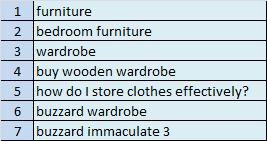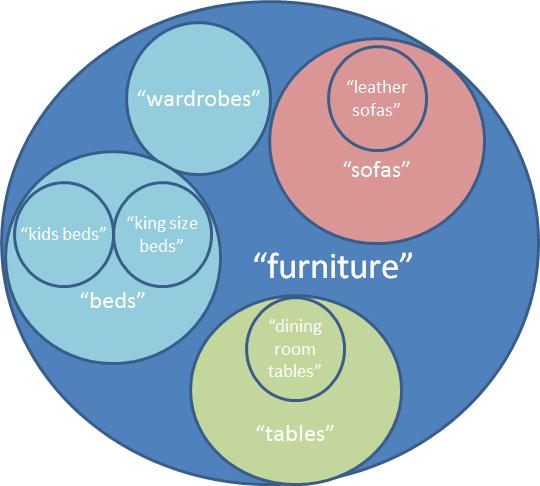How Agencies Build Successful PPC Campaigns
The most important factor to consider in an online business is your customer –
- Who are they?
- What do they want?
- How do you find them?
In order to create a truly successful Pay Per Click account to advertise your business, you and your agency need to understand your customer’s deeper needs and the different keyword searches they will perform to find what they want.
- Some people know exactly what they’re looking for, others don’t.
- Some people are ready to buy, others aren’t.
- Some people have a problem that they want to fix, but don’t know how to do it.
PPC accounts need to be built with all markets in mind, and one needs to be aware of the crossover with potentially irrelevant markets. Let’s look at the following keywords:
Picture the person typing each keyword and try and understand what they’re looking for. Here are some thoughts to assist you:
Keyword 1 – “furniture”
- This is a very generic head term. The person typing this isn’t really specifying what they’re looking for – they just know they want to look at some furniture.
- They could be looking to buy straight away, or they might just be researching.
- There are 60,500 searches per month on the exact keyword “furniture”. Potentially, it can therefore deliver a lot of traffic to your site but might not be the best keyword for generating conversions.
When to use it:
- You have a website that sells all kinds of furniture
- You have competitive prices
- You have a broad range of brands and styles
When to avoid it:
- You specialise in one type of furniture – eg, sofas
- You have higher than average prices
- You have a limited range of brands and styles
The keyword “furniture” will convert on most sites selling some form of furniture, but the difference in conversion rate will vary enormously. You should therefore carefully consider your bid prices, because you may only be able to satisfy a small percentage of the market, and you can’t over pay to bring ambiguous traffic to the website.
Here is an example of how the market might break down. Each circle represents the size of a market, as defined by the primary keyword.
(Please note that this is for illustration only, and the figures aren’t based on fact!)
Each circle contains a different sized market, and you have to think about whether your product group is big enough to be able to bid on a broader keyword. If you’re just selling leather sofas, would you really want to bid on the word “furniture” having seen a chart like this?
Try and construct some market circles for your own company, and think about what it means for you.
Keyword 2 – “bedroom furniture”
- This is still quite a broad term, but the market can be categorised more accurately. The person is clearly stating which room they are looking to furnish, thereby increasing the keyword relevance by a good amount. The number of products they are potentially looking for has reduced greatly.
- Google shows there are 74,000 searches per month for the term “bedroom furniture”. Therefore it’s a bigger term than simply “furniture”.
When to use it:
- You specialise in selling bedroom furniture
- You have a general furniture site that includes a bedroom furniture section
In this instance, it’s hard to know for sure which site would do better. You would assume that the site specialising in bedroom furniture would have more choice and better pricing. However, the site with other categories of products may be more appealing because there’s the opportunity to buy things for other rooms at the same time.
When to be careful:
- You have a limited supply of bedroom furniture
- You don’t have particularly competitive prices
There’s a high likelihood of achieving a much better conversion rate on the term “bedroom furniture” than “furniture” (assuming you have the right products). You are probably going to be able to bid higher on these terms as a result.
Keyword 3 –” wardrobe”
- The most specific keyword yet. The number of products the person might be looking for has reduced greatly. We’re now down to 14,800 searches per month, but we know that all of them are interested in wardrobes. What we don’t know, is whether they’re browsing or ready to buy.
When to use it:
- You only sell wardrobes
- You specialise in selling bedroom furniture
- You have a general furniture site that includes a wardrobe section
When to be careful:
- You have a small range of wardrobes
Think of how the person will react in each case. If they land on a site that just has wardrobes, they know they’re in the right place and are likely to interact very well with it. However, if they land on a large furniture site with poor navigation and no advanced search options, they may find it difficult to find what they’re looking for. This could therefore lead to a lower conversion rate on the term “wardrobe”.
Keyword 4 –”buy wooden wardrobe”
- This is a very exciting keyword! This person has not only specified that they’re looking for a particular type of wardrobe, but that they’re ready to buy straight away.
- They may be in a rush so you want to grab their attention straight away. Someone typing this will probably responds well to a “Buy Online Now!” style call to action in the advert.
- Make sure you land them on the section of the website selling wooden wardrobes – don’t make them have to click around before finding what they want!
- Traffic like this is premium and you need to ensure you get as much of it as possible.
When to use it:
- All the time – ideally this keyword should be showing every time it’s searched (assuming you have the products and budget)
When to be careful:
- If you don’t have a buy online option. This person is probably in a hurry.
Keyword 5 – “how do I store clothes effectively?”
- Question based keywords can be very broad, but may also be highly relevant. This person is looking for a solution to a problem, and you might have the answer to it. The problem is whether it’s the right solution. Someone typing this could also have their problem solved by buying:
- chest of drawers
- divan bed
- suitcase
- shelving units in a commercial shop
- vacuum sealed bags for long term storage
- Think about the keyword again – do you know if they are a general shopper or someone looking to store clothes efficiently in their own shop? Or maybe they’re going on holiday and want a way of taking as many clothes as possible? Understanding the intention from the keyword is crucial for advertising to them effectively.
When to use it:
- If you convert really well for the relevant products and want more traffic.
When not to use it:
- If you don’t convert for more specific terms like “wardrobes”. If you don’t convert well for specific terms, you’re unlikely to convert well for broader terms.
Keyword 6 – “buzzard wardrobe”
- This is an example of brand specific traffic – people who are looking for a specific make. This is generally high converting traffic, although there are other factors to consider. You have to ensure that you sell a full range of the brand you’re targeting, and that the prices are competitive.
- It’s best practice to include keywords for all the brands you have. The traffic you get will be highly qualified and you’ll quickly be able to learn what your most profitable products are.
- If you can spend your whole PPC budget on good converting brand keywords, you have no need for generic head terms which might waste money.
NOTE: Be aware that you can bid on brand terms – even if you are not the manufacturer and are simply reselling their products. You shouldn’t need permission from the brand owner however you should be aware that you cannot pass yourself off as the brand itself. This would be illegal. PPC campaign managers will always use brand names (as they create very valuable traffic) but will do so with caution and only where appropriate.
Keyword 7 – “buzzard immaculate 3”
- This is a keyword that specifies the make and model of the product they want, and is usually the best converting traffic you can get. Someone is defining exactly what they want, and you have an excellent chance of converting them (assuming you have the right product and competitive prices).
- It’s essential that you include the product code in the advert, and that you land them on exactly the right page. This reinforces the message that the customer has found the right place.
- You’re likely to see a lot of cheap conversions through product code keywords, because clicks can be cheap and conversion rates may be very high.
When to use it:
- For every product you sell on the website. Every product code should be added as a keyword and have a unique ad created for it.
- You should set up a Google Merchant Centre product feed and link it to your Adwords account. That way, the images of the products will be included in the adverts, further reinforcing that yours is the best/most relevant ad to click.
- It’s not guaranteed that product code keywords will convert well, because there may be rivals selling the same product cheaper, but if you follow the best practice rules, you’re likely to get excellent results. It’s also helpful to do some competitor research to ensure your business is ahead of the game.
When to be careful:
- If the product code is quite ambiguous – eg, “buzzard 1” may have crossover with other products that may not be relevant.
Summary
Having read the above, and particularly if you manage your PPC in-house – take another look at your Adwords accounts and consider the keywords you have. Ask yourself the following questions:
- Have I properly identified my target markets?
- Have I considered which keywords are relevant to each market?
- Have I structured the account in a way that gets as much relevant traffic as possible?
- Am I relying on more generic head terms to drive traffic?
- Do I really understand my conversion rate for each market?
Hopefully this will help get the creative juices flowing and you can make some positive changes to your PPC strategy. If however you now question your campaigns, or those created by your PPC agency, why not put some time aside to address the problems – no business in this climate can afford to waste valuable budget on poorly set up PPC campaigns.
And if you are still in doubt – contact us for a free audit of your PPC campaign setup!




